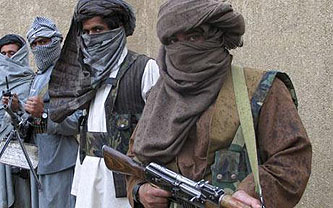 Matt Steinglass highlights a passage from the New York Times today about the capture of Mullah Abdul Ghani Baradar, the Taliban’s top military commander. According to the Times, Baradar’s capture “could come at the expense of the Afghan government of Hamid Karzai and complicate reconciliation efforts his government has begun”:
Matt Steinglass highlights a passage from the New York Times today about the capture of Mullah Abdul Ghani Baradar, the Taliban’s top military commander. According to the Times, Baradar’s capture “could come at the expense of the Afghan government of Hamid Karzai and complicate reconciliation efforts his government has begun”:
An American intelligence official in Europe conceded as much, while also acknowledging Mullah Baradar’s key role in the reconciliation process. “I know that our people had been in touch with people around him and were negotiating with him,” the official said, speaking on the condition of anonymity because he was not authorized to discuss the issue.
….“He was the only person intent on or willing for peace negotiations,” said Hajji Agha Lalai, former head of the government-led reconciliation process in the city of Kandahar, who has dealt with members of the Taliban leadership council for several years.
He and other officials in Afghanistan who are familiar with the Taliban leadership said Mullah Baradar’s arrest by Pakistani intelligence, and his interrogation by Pakistani intelligence officers and American agents, could play out in two ways. Mullah Baradar might be able to persuade other Taliban to give up the fight. Or if he is perceived to be mistreated, that could end any hopes of wooing other Taliban.
Naturally, this is all completely opaque. Apparently Pakistan is miffed that they’ve been left out of negotiations with the Taliban, and they want back in. Getting Baradar out of the picture might have simply been a chess move on their part to eliminate someone they didn’t have any control over.
Or not. Maybe Baradar’s capture means that Pakistan is getting serious about fighting the Taliban on their own soil, which has been the standard narrative up until now. There’s no telling, really. But it’s worthwhile at least keeping in mind that there are multiple, competing storylines here.

















